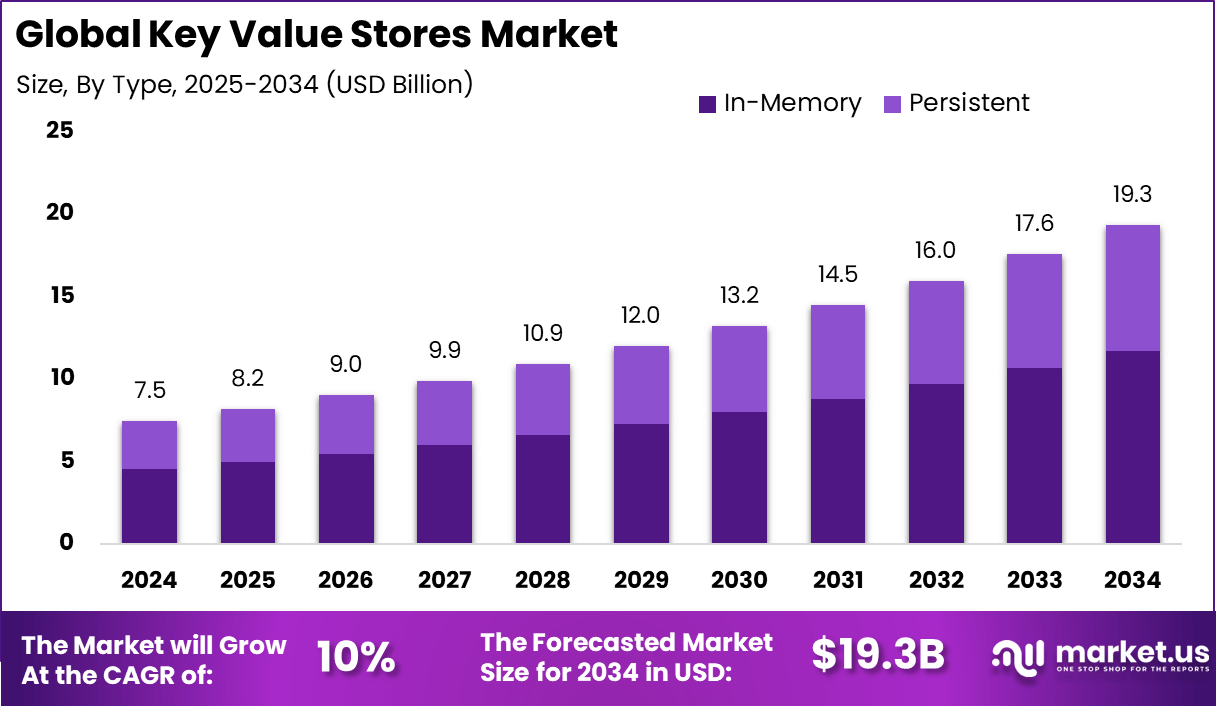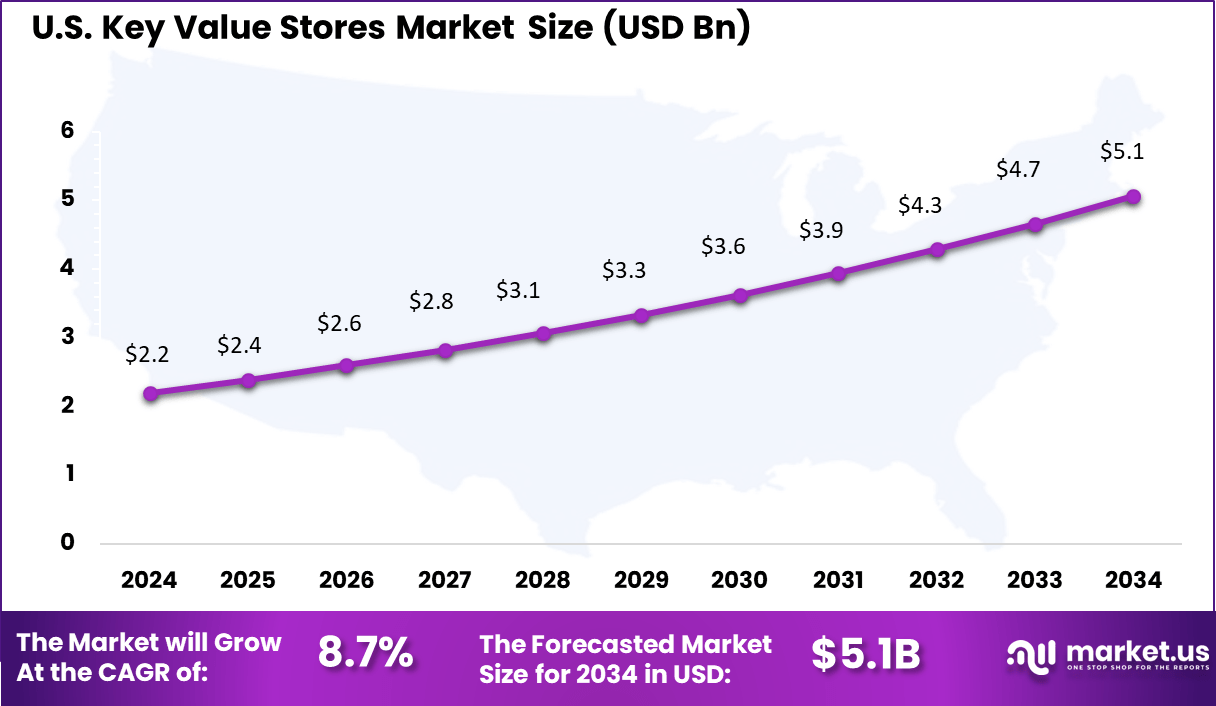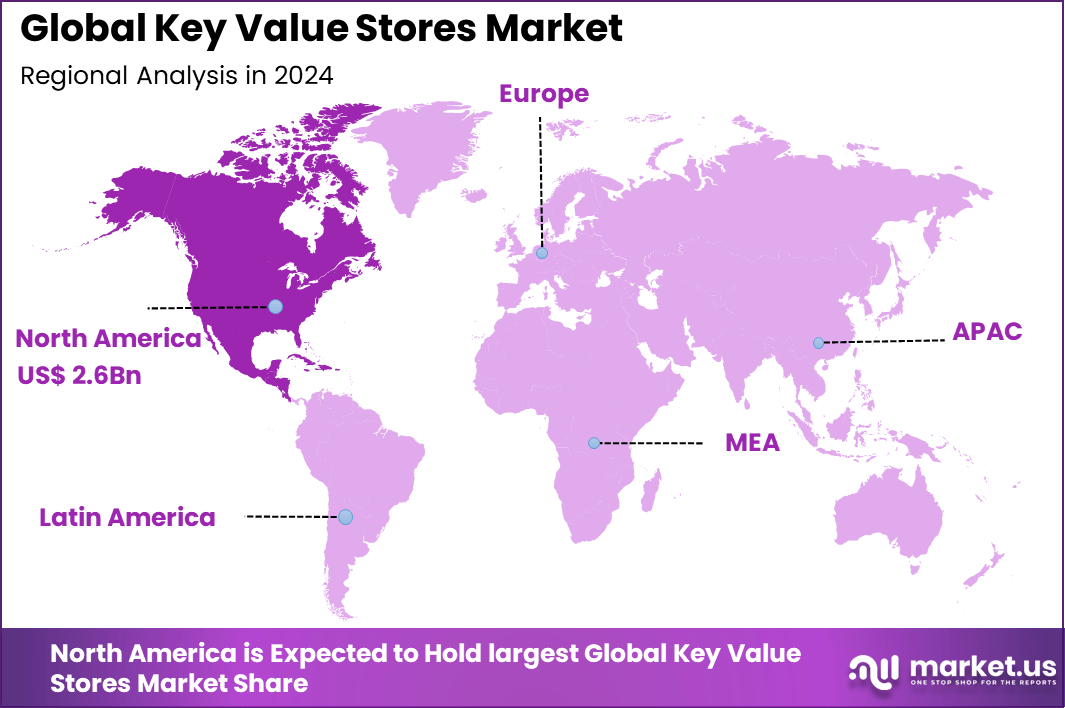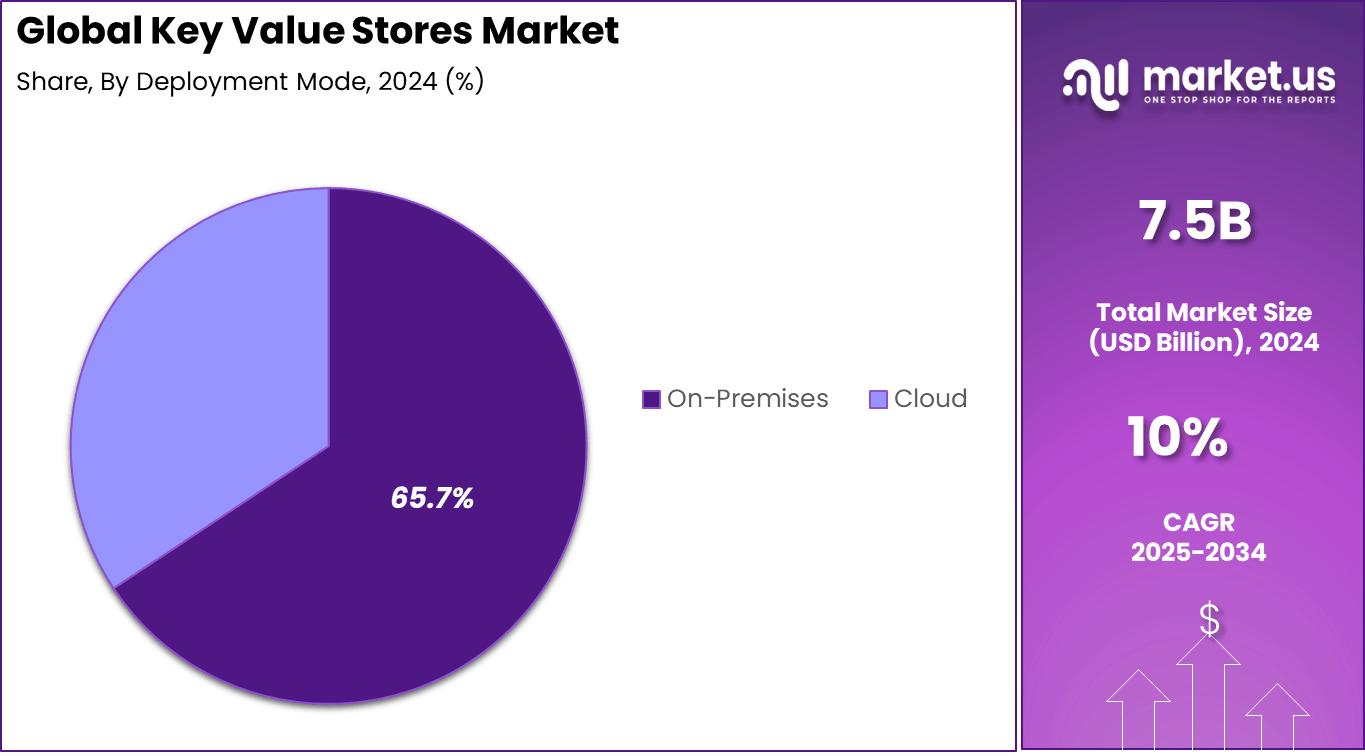Global Key Value Stores Market Size, Share, Industry Analysis Report By Type (In-Memory, Persistent), By Deployment Mode (On-Premises, Cloud), By Enterprise Size (Small and Medium Enterprises, Large Enterprises), By Application (Retail, BFSI, IT and Telecommunications, Healthcare, Government, Others), By Regional Analysis, Global Trends and Opportunity, Future Outlook by 2025-2034
- Published date: Sept. 2025
- Report ID: 159820
- Number of Pages: 250
- Format:
-
keyboard_arrow_up
Quick Navigation
- Report Overview
- Key Insight Summary
- Market Overview
- Role of Generative AI
- Analysts’ Viewpoint
- Investment and Business Benefits
- US Market Size
- By Type
- By Deployment Mode
- By Enterprise Size
- By Application
- Emerging Trends
- Growth Factors
- Key Market Segments
- Driver
- Restraint
- Opportunity
- Challenge
- Competitive Analysis
- Recent Developments
- Report Scope
Report Overview
The Global Key Value Stores Market size is expected to be worth around USD 19.3 Billion By 2034, from USD 7.5 billion in 2024, growing at a CAGR of 10% during the forecast period from 2025 to 2034. In 2024, North America held a dominan market position, capturing more than a 34.8% share, holding USD 2.6 Billion revenue.
The Key Value Stores market is a critical segment of the database industry, specializing in storing data as key-value pairs for fast and scalable access. This type of database supports a wide range of applications where speed and simplicity in data retrieval are essential, such as e-commerce cart sessions, real-time analytics, and IoT device data management. The market is growing due to demand for efficient, flexible data management for large volumes.

Key Insight Summary
- In-memory type holds the largest share at 60.7%, reflecting demand for faster data processing and real-time analytics.
- On-premises deployment leads with 65.7%, as enterprises continue to prefer greater control and data security.
- Large enterprises dominate adoption at 70.7%, driven by scalability needs and complex infrastructure.
- Retail sector accounts for 35.7%, using key value stores for personalization, inventory management, and transaction speed.
- North America leads with 34.8%, supported by strong digital infrastructure and enterprise adoption.
- The US market reached USD 2.20 billion and is expanding at a CAGR of 8.7%, underlining strong enterprise investment and steady growth momentum.
Market Overview
Top driving factors for the Key Value Stores market include the increasing adoption of NoSQL databases fueled by rising data generation across industries like banking, retail, healthcare, and technology. The growth of cloud computing and real-time analytics have created demand for scalable solutions that key-value stores provide.
Technologies supporting microservices architecture and edge computing further enable deployment of key-value stores in distributed environments, making performance optimization and low latency critical. Globally, regions with strong digital transformation initiatives, particularly North America and Asia Pacific, are leading adoption.
Demand analysis shows that enterprises are increasingly investing in key-value store technologies for real-time data processing, cost-effective scalability, and operational efficiency. Small and medium enterprises also recognize their benefits, especially with cloud-native solutions reducing infrastructure burdens. Key-value stores facilitate quick data retrieval which is essential for data-driven decision-making in fast-paced digital economies.
Role of Generative AI
The role of generative AI in key-value stores is increasingly important as it enhances data management efficiency and automation. Around 48% of service professionals believe generative AI improves customer self-service options, and 47% see it automating communication processes.
This technology supports quicker, more responsive data access and personalization while complementing existing AI tools for better inventory and supply chain management. As a result, generative AI helps optimize operations and decision-making in systems relying heavily on key-value databases, which are essential for real-time data processing and fast retrieval.
Analysts’ Viewpoint
The increasing adoption technologies around key-value stores include cloud-based platforms, in-memory computing, distributed databases, and serverless architectures. Cloud-native adoption allows businesses to leverage flexibility, reliability, and lower total cost of ownership. The rise of microservices encourages use of key-value stores for decoupled, scalable data storage that integrates well with container orchestration.
Additionally, innovations in edge computing expand their use by enabling local data processing with low latency for applications like autonomous vehicles or smart manufacturing. Key reasons for adopting key-value store solutions revolve around their speed, simplicity, scalability, and flexibility.
Businesses benefit from reduced data access times, easier scaling to accommodate growing data, and support for real-time analytics crucial for customer experience and operational insights. They also reduce infrastructure complexity and operational costs compared to traditional relational databases. The ability to quickly adapt to dynamic workloads and multi-cloud environments further makes them attractive for modern digital systems.
Investment and Business Benefits
Investment opportunities in the key-value stores market are significant, especially around cloud service providers expanding database offerings and startups innovating in distributed and AI-optimized database solutions. Investors are drawn to the growing demand for real-time analytics, IoT deployments, and cloud migration trends.
Opportunities also lie in developing advanced security features and ensuring regulatory compliance through enhanced data protection capabilities. Emphasis on hybrid and multi-cloud integration strategies offers promising avenues for scalable, flexible solutions.
From a business benefits perspective, key-value stores deliver improved application performance, increased speed in responding to customer demands, and enable new capabilities such as personalized services and predictive analytics. They support operational agility by simplifying data management across complex infrastructures.
US Market Size
The US is a central part of this growth, with adoption trends supported by large-scale IT deployments across multiple sectors. The market continues to expand at a steady 8.7% CAGR, highlighting the sustained demand for responsive data management technologies that can support emerging digital transformation goals.

In 2024, North America held 34.8% share of the market, driven by the region’s mature IT infrastructure and early adoption of advanced database technologies. Enterprises in the region have been quick to use key value stores to optimize application speed, particularly for analytics-heavy workflows.

By Type
In 2024, In-memory key value stores accounted for the largest share at 60.7%. Their lead is linked to the high-speed performance they deliver by keeping data in RAM, which reduces latency and accelerates access. This makes them highly effective for scenarios where real-time responsiveness is critical, such as online transactions or rapid data lookups. Industries dealing with massive datasets rely on this capability to maintain seamless user experiences and operational efficiency.
Another reason for their strong uptake is the shift toward applications that demand sub-millisecond response times. From recommendation engines to live analytics, in-memory systems are enabling advanced business functions that disk-based solutions struggle to match. Their ability to handle concurrent queries without a dip in performance ensures they remain the preferred option for enterprises with data-intensive workloads.
By Deployment Mode
In 2024, On-premises deployment captured 65.7% of the market. Businesses often prefer this approach because it provides better control over data management, security, and compliance. For organizations with strict data regulations or those operating in industries like finance and healthcare, the on-premises model helps meet internal and legal requirements while minimizing risk.
The growing emphasis on privacy and governance further supports the adoption of this mode. Enterprises seeking predictable costs and full customization over infrastructure continue to keep on-premises options ahead, even as hybrid and cloud models evolve. This balance between control and performance has been critical to sustaining its dominance.

By Enterprise Size
In 2024, Large enterprises represented a strong share of 70.7% in the key value stores market. Their demand is driven by the need to handle large-scale data processing and support mission-critical applications. With more complex operational environments, these companies require systems that deliver both scalability and resilience. Key value stores, with their speed and flexibility, meet these needs effectively.
Additionally, these organizations have the financial and technical resources to adopt advanced data storage solutions. They often use key value stores as part of larger multi-database strategies, enhancing their ability to support applications ranging from fraud detection to digital personalization. This segment’s lead is a reflection of the essential role key value stores play in enabling digital operations at scale.
By Application
In 2024, Retail accounted for 35.7% of the applications segment. The sector depends heavily on real-time data processing to power functions like customer analytics, inventory tracking, and dynamic pricing. Key value stores enable faster query responses, which directly enhance customer experiences both online and in physical outlets.
As retail moves toward personalization as a growth driver, the importance of low-latency data handling rises. From tailoring promotions to streamlining supply chain operations, key value stores provide the backbone for data-driven retail strategies. This continued integration ensures retail remains a leading application area for these solutions.
Emerging Trends
Several emerging trends are shaping the key-value store market. The adoption of cloud-native solutions is growing rapidly, along with the integration of microservices architecture, which benefits from the scalable and flexible nature of key-value stores.
Real-time data applications like IoT and streaming analytics are pushing the demand for low-latency storage solutions. Managed cloud services are becoming more mature, simplifying deployment for businesses of all sizes. These trends support a steady market expansion driven by scalability, speed, and growing global digital transformation initiatives.
Growth Factors
Key growth factors for key-value stores include the rising need for handling vast data volumes, driven by sectors such as finance, healthcare, retail, and technology. The growth is also fueled by the increasing use of AI and machine learning technologies that require highly scalable, fast databases.
Another important driver is the shift towards real-time analytics, which key-value stores facilitate due to their performance capabilities. This combination of big data demand and advanced technology applications creates a strong growth environment for key-value stores.
Key Market Segments
By Type
- In-Memory
- Persistent
By Deployment Mode
- On-Premises
- Cloud
By Enterprise Size
- Small and Medium Enterprises
- Large Enterprises
By Application
- Retail
- BFSI
- IT and Telecommunications
- Healthcare
- Government
- Others
Regional Analysis and Coverage
- North America
- US
- Canada
- Europe
- Germany
- France
- The UK
- Spain
- Italy
- Russia
- Netherlands
- Rest of Europe
- Asia Pacific
- China
- Japan
- South Korea
- India
- Australia
- Singapore
- Thailand
- Vietnam
- Rest of Latin America
- Latin America
- Brazil
- Mexico
- Rest of Latin America
- Middle East & Africa
- South Africa
- Saudi Arabia
- UAE
- Rest of MEA
Driver
Rising Demand for Real-Time Data Processing
The growth of key-value stores is strongly driven by the increasing demand for real-time data processing in many industries. As businesses generate huge amounts of data from digital applications, social media, and IoT devices, they need fast, scalable databases that can handle this volume with low latency.
Key-value stores offer a simple yet powerful way to quickly retrieve and update data, making them ideal for real-time analytics and decision-making. For instance, e-commerce platforms depend on key-value stores to instantly process user data and personalize experiences, fueling this demand.
This demand for speed and scalability is becoming more urgent as applications evolve to require instantaneous responses and high throughput. Key-value stores excel in these scenarios due to their efficient architecture and flexibility.
Their ability to support massive datasets in cloud environments further boosts adoption among large enterprises and tech startups alike. The result is significant market growth fueled by the need to optimize data infrastructure for real-time insights and operations.
Restraint
Concerns Over Data Security and Privacy
Despite their advantages, key-value stores face restraint due to ongoing concerns about data security and privacy. These databases often hold critical information accessed by many applications, and as such, they must comply with stringent data protection regulations globally.
Key-value stores traditionally focus on speed and scalability, which can sometimes make integrating robust security features challenging. For instance, enterprises in finance and healthcare remain cautious about adopting these stores fully because of compliance risks and fears over data breaches.
This restraint limits how quickly some sectors adopt key-value stores, especially when regulations like GDPR and CCPA impose strict data handling requirements. Vendors must invest heavily in security enhancements, encryption, and audit capabilities to address these concerns.
The evolving nature of cyber threats further complicates safe deployment, demanding continuous upgrades and expertise. Thus, while performance is a strength, data security remains a critical barrier for wider acceptance.
Opportunity
Growth in Cloud-Native and Serverless Architectures
The rising adoption of cloud-native and serverless computing models presents a major opportunity for key-value stores. These modern architectures need scalable, flexible, and cost-efficient databases that can handle unpredictable workloads and support distributed operations.
Key-value stores fit perfectly into cloud ecosystems by offering managed, on-demand data storage with low overhead. For instance, businesses moving to hybrid or multi-cloud environments leverage key-value stores to seamlessly scale across different platforms without vendor lock-in. Moreover, the growth of edge computing, where data is processed locally closer to users, also drives key-value store demand.
This allows faster response times and reduced load on central servers, expanding use cases in smart manufacturing, automotive, and IoT applications. Vendors who innovate around cloud integration, cross-cloud compatibility, and easy deployment tools will unlock significant market growth and broaden adoption beyond traditional large enterprises.
Challenge
Complexity in Managing Large-Scale Distributed Systems
A key challenge for key-value stores is managing the complexity that arises when deploying large-scale distributed systems. As organizations scale their applications globally, ensuring consistent performance and data availability across multiple nodes becomes difficult. Maintaining data replication, synchronization, and fault tolerance requires advanced infrastructure and skilled database administrators.
For example, distributed key-value databases must balance speed with reliability without sacrificing data integrity under heavy loads. This technical complexity can be a hurdle for organizations lacking expertise or resources to manage these systems effectively.
It increases operational costs and can lead to outages or degraded user experience if not handled properly. Vendors must develop automation, monitoring, and simplified management tools to help customers overcome these issues. Addressing this challenge is crucial for expanding key-value stores’ appeal beyond technology leaders to mainstream businesses.
Competitive Analysis
The Key Value Stores Market is led by global cloud providers such as Microsoft Azure, Google Cloud Platform, IBM Cloud, Oracle, SAP HANA, and Alibaba Cloud. These companies integrate key-value databases into their cloud ecosystems, offering high scalability, low-latency storage, and seamless integration with enterprise applications.
Specialized database vendors including Redis Labs, Couchbase, Aerospike, DataStax, and ScyllaDB are central to innovation in this market. Redis Labs leads with in-memory data structures optimized for speed, while Aerospike and ScyllaDB deliver strong performance for real-time analytics and high-throughput use cases.
Emerging and niche players such as ArangoDB, Hazelcast, MarkLogic, RavenDB, Tarantool, Riak KV, VoltDB, and Memcached contribute specialized technologies. These solutions emphasize flexibility, open-source innovation, and strong caching performance.
Top Key Players in the Market
- Amazon Web Services (AWS)
- Microsoft Azure
- Google Cloud Platform
- IBM Cloud
- Redis Labs
- Couchbase
- Aerospike
- DataStax
- Oracle
- Alibaba Cloud
- SAP HANA
- ArangoDB
- ScyllaDB
- Hazelcast
- MarkLogic
- RavenDB
- Tarantool
- Riak KV
- VoltDB
- Memcached
- Others
Recent Developments
- February 2025: Aerospike released version 8 of its database, prioritizing transaction processing efficiency and strong consistency at scale. Aerospike highlighted its role in powering AI workloads while focusing on performance improvements across major cloud platforms such as AWS, Google Cloud, and Azure.
- February 2025: IBM announced its intent to acquire DataStax, a top NoSQL and vector database provider, to deepen its watsonx AI offerings. The acquisition aims to enhance enterprises’ ability to leverage unstructured data for generative AI, bringing DataStax’s AstraDB and enterprise database tech into IBM’s portfolio.
- August 2024: Redis Labs delivered its largest update with Redis 8, focusing on enhanced speed and vector database features optimized for generative AI workloads. They introduced an AI copilot for developers and a new integration service that simplifies data ingestion without third-party tools. Redis adjusted their licensing to prevent large cloud vendors from leveraging Redis technology without licenses, catalyzing a surge in innovation.
- October 2024: Microsoft released System Center 2025, which included enhanced support for Azure Stack hyperconverged infrastructure and boosted security through integration with Azure Key Vault. This release supports managing complex heterogeneous infrastructures and secures critical enterprise data operations.
Report Scope
Report Features Description Market Value (2024) USD 7.5 Bn Forecast Revenue (2034) USD 19.3 Bn CAGR(2025-2034) 10% Base Year for Estimation 2024 Historic Period 2020-2023 Forecast Period 2025-2034 Report Coverage Revenue forecast, AI impact on Market trends, Share Insights, Company ranking, competitive landscape, Recent Developments, Market Dynamics and Emerging Trends Segments Covered By Type (In-Memory, Persistent), By Deployment Mode (On-Premises, Cloud), By Enterprise Size (Small and Medium Enterprises, Large Enterprises), By Application (Retail, BFSI, IT and Telecommunications, Healthcare, Government, Others) Regional Analysis North America – US, Canada; Europe – Germany, France, The UK, Spain, Italy, Russia, Netherlands, Rest of Europe; Asia Pacific – China, Japan, South Korea, India, New Zealand, Singapore, Thailand, Vietnam, Rest of Latin America; Latin America – Brazil, Mexico, Rest of Latin America; Middle East & Africa – South Africa, Saudi Arabia, UAE, Rest of MEA Competitive Landscape Amazon Web Services (AWS), Microsoft Azure, Google Cloud Platform, IBM Cloud, Redis Labs, Couchbase, Aerospike, DataStax, Oracle, Alibaba Cloud, SAP HANA, ArangoDB, ScyllaDB, Hazelcast, MarkLogic, RavenDB, Tarantool, Riak KV, VoltDB, Memcached, Others Customization Scope Customization for segments, region/country-level will be provided. Moreover, additional customization can be done based on the requirements. Purchase Options We have three license to opt for: Single User License, Multi-User License (Up to 5 Users), Corporate Use License (Unlimited User and Printable PDF) Frequently Asked Questions (FAQ)
What is a key-value store?A key-value store is a simple type of non-relational (NoSQL) database that stores data as a collection of key–value pairs. Each record consists of a unique key and a value associated with that key. The key is used to look up the data, and the value can be any kind of data from a simple string to a complex object. Key-value stores are schema-less, meaning they do not require a fixed data model and allow flexible data storage without predefined structures. They are known for speed, simplicity, and scalability.
What are popular key-value stores?Popular key-value store examples include Redis, Amazon DynamoDB, Aerospike, Apache Cassandra (as wide column store with key-value features), Couchbase, Memcached, Riak KV, and ScyllaDB. These stores are widely used in high-performance, cloud-based distributed systems
What is an example of a key-value datastore?Redis is often cited as a key example. It supports simple to complex data structures such as strings, lists, maps, and hashes and provides very high performance for fast reads and writes. DynamoDB from Amazon Web Services is another widely used managed key-value and document store database.
What is the difference between key-value stores and document stores?Key-value stores treat the value as an opaque blob and do not interpret its contents. They offer high speed for simple lookups by key but limited query capabilities. Document stores, a subtype of NoSQL databases, store semi-structured data in JSON-like documents allowing querying and indexing of fields within the document.

-
-
- Microsoft Azure
- Google Cloud Platform
- IBM Cloud
- Redis Labs
- Couchbase
- Aerospike
- DataStax
- Oracle
- Alibaba Cloud
- SAP HANA
- ArangoDB
- ScyllaDB
- Hazelcast
- MarkLogic
- RavenDB
- Tarantool
- Riak KV
- VoltDB
- Memcached
- Others













